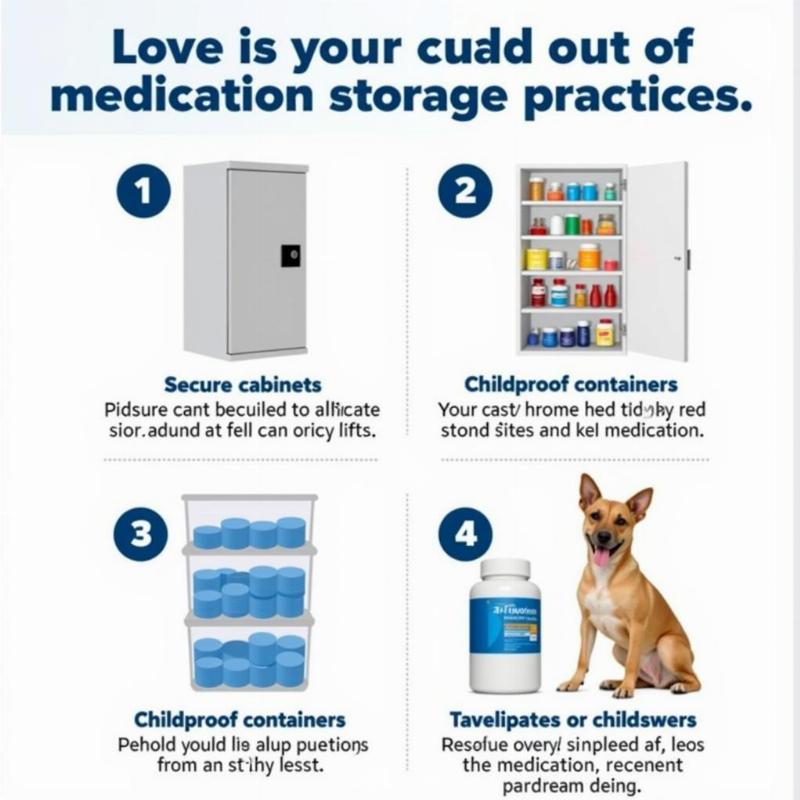Carprofen, a non-steroidal anti-inflammatory drug (NSAID) commonly used to manage pain and inflammation in dogs, is generally safe when administered as directed by a veterinarian. However, like any medication, exceeding the prescribed dosage can lead to serious health consequences. Understanding the toxic dose of carprofen in dogs is crucial for responsible pet owners. This article will explore the potential dangers of carprofen overdose, symptoms to watch out for, and essential steps to take if you suspect your dog has ingested a toxic amount.
Carprofen toxicity can manifest in various ways, affecting multiple organ systems in dogs. Gastrointestinal issues, such as vomiting, diarrhea, and loss of appetite, are often the first signs. More severe cases can lead to kidney and liver damage, ulcers, and even seizures or coma. While a specific “toxic dose” can vary depending on factors like individual dog sensitivity, underlying health conditions, and concurrent medications, any amount exceeding the veterinarian’s prescribed dosage should be considered potentially dangerous.
Recognizing Carprofen Overdose Symptoms in Dogs
Early detection of carprofen toxicity is vital for effective treatment. Being aware of the common symptoms can help pet owners take swift action:
- Gastrointestinal distress: This includes vomiting, diarrhea (sometimes bloody), decreased appetite, and abdominal pain.
- Changes in behavior: Lethargy, weakness, incoordination, and increased thirst or urination can be indicative of toxicity.
- Neurological signs: In severe cases, dogs may exhibit seizures, tremors, or changes in mental status.
- Liver and kidney problems: Jaundice (yellowing of the gums and whites of the eyes) and changes in urination patterns can suggest liver or kidney involvement.
What to Do if You Suspect Carprofen Overdose
If you suspect your dog has ingested a toxic dose of carprofen, immediate veterinary attention is crucial. Do not induce vomiting unless specifically instructed by a veterinarian. Contact your veterinarian or the ASPCA Animal Poison Control Center immediately. Timely intervention can significantly improve the prognosis. Be prepared to provide information about your dog’s weight, the amount of carprofen ingested, and any other medications your dog is currently taking.
Preventing Carprofen Overdose in Dogs
Prevention is the best approach to avoid carprofen toxicity. Always store medications securely and out of reach of pets. Follow your veterinarian’s instructions precisely regarding dosage and administration. Never give your dog carprofen intended for humans or other animals. Regular veterinary checkups are also important to monitor your dog’s response to carprofen and to identify any potential adverse effects early on.
 Safe medication storage practices for dog owners
Safe medication storage practices for dog owners
Safe Pain Management Alternatives for Dogs
While carprofen can be an effective pain management tool, exploring alternative options can be beneficial, especially for dogs with sensitivities or pre-existing conditions. Discuss these alternatives with your veterinarian:
- Other NSAIDs: While carprofen is a commonly used NSAID, other options, such as meloxicam or deracoxib, might be more suitable for certain dogs.
- Non-pharmacological approaches: Acupuncture, physical therapy, and laser therapy can be effective in managing pain and inflammation without the risks associated with medications.
- Supplements: Certain supplements, such as glucosamine and chondroitin, can support joint health and help manage arthritis pain.
Conclusion
Understanding the risks associated with carprofen and recognizing the signs of toxicity is crucial for responsible dog ownership. By adhering to prescribed dosages, practicing safe medication storage, and maintaining open communication with your veterinarian, you can ensure your dog receives the pain relief they need while minimizing the potential for harmful side effects. Never hesitate to seek immediate veterinary care if you suspect your dog has ingested a toxic dose of carprofen.
FAQ:
- What is the most common sign of carprofen overdose in dogs? Vomiting and diarrhea are often the first signs.
- Can I induce vomiting if my dog overdoses on carprofen? No, not without consulting a veterinarian. Inducing vomiting could worsen the situation in certain cases.
- What should I do if I find my dog has ingested carprofen without a prescription? Immediately contact your veterinarian or the ASPCA Animal Poison Control Center.
- Are there any natural alternatives to carprofen for pain relief in dogs? Discuss options like acupuncture, physical therapy, and supplements with your veterinarian.
- How can I prevent my dog from accessing my medications? Store all medications in a secure location out of your dog’s reach, ideally in a locked cabinet.
- Is carprofen safe for all dogs? No, some dogs may have sensitivities or pre-existing conditions that make carprofen unsuitable. Consult your veterinarian.
- What information should I have ready if I suspect my dog has overdosed on carprofen? Your dog’s weight, the amount of carprofen ingested, and any other medications they are taking.
Beautdogs.us: Your Trusted Source for Dog Care
Beautdogs.us is a leading dog lifestyle website in the US, providing comprehensive and reliable information on dog care, breeds, and products. We offer expert advice for both new and experienced dog owners, covering everything from health and nutrition to training and grooming. Beautdogs.us is your one-stop shop for all things dog-related. Contact us for personalized advice and recommendations: Email: [email protected], Phone: +1 501-555-7529.